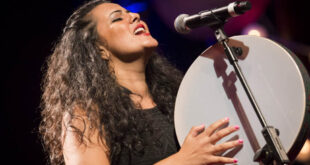Debate and discussion are at the cornerstone of any democracy. There have been many changes throughout the Middle East in the past year with the elections in Iraq, Palestine, and Saudi Arabia, as well as the demonstrations in Lebanon and the Mubarak Initiative. As the political landscape of the Middle East changes, so must the media that covers it. The media should report on these stories objectively and accurately, and provide expert analysis, so that viewers can make their own informed decisions about the changes affecting the region.
In this respect, Alhurra television could not have been launched at a better time. Alhurra attempts to provide a forum for the ideas and issues to be discussed and its anchors and producers work hard on reporting without bias. With a television network like Alhurra, Arabic-speaking people living in all parts of the region can see first hand the changes taking place in their own region. Through straight-forward reporting and discussion, viewers can make their own informed decisions about the issues affecting them.
A perfect example of the importance of media, and the role of Alhurra, took place during the Iraqi elections. The outcome of the election was not as important as the fact that Iraqis were able to decide on their own leadership, but Iraqi citizens needed information to help wade through all of the issues and candidates. Leading up to the elections, Alhurra and the second channel dedicated to Iraq, Alhurra-Iraq, provided comprehensive coverage of concerns on the minds of voters. Through a series of public service announcements on Alhurra-Iraq, Iraqi citizens were encouraged to vote. Alhurra provided all of the candidates an opportunity to state their position on issues, and talk shows were dedicated to discussing the political platforms of the candidates and voters' questions. Alhurra also broadcast a historical debate among the candidates which I was able to watch and report about to the Western media.
It has been just over a year since the launch of Alhurra television. A lot was made in the press about the channel before it even went on the air: that it was going to be propaganda, or that its goal was to make Arabic-speakers like the US and US policies. However, research done by ACNielsen and Ipsos-Stat, as well as feedback from the region, shows that Alhurra has overcome these perceptions and made its mark as a source of news and information. Basically, it has slowly emerged as the voice of the voiceless in the region. It is watched by those who reject the propaganda of the ideological media and the dictatorship-controlled channels.
The most recent surveys conducted by Ipsos-Stat show that 34 percent of adults having satellite households watch Alhurra on a weekly basis. The same surveys showed that 61 percent of Alhurra viewers found the news to be reliable. These are impressive numbers by anyone's standards, but even more remarkable when you take into account the fact that the network was launched just over a year ago.
Alhurra's impact on the region is much more than these numbers would indicate. In its short time on the air, Alhurra has gained its footing in covering news, often being at the forefront of a news story or a debate. Whether Alhurra broadcast live in Martyr's Square during the Lebanese demonstrations or inside voting stations throughout Iraq, it was able to report, analyze, and bring viewers an inside look at the news affecting them.
Alhurra's talk shows also have had an impact. They have fueled debate on issues such as human rights, democracy, and the role of women -- topics that were not often discussed outside of the home and certainly not to millions of people on a television network. When the Syrian Authors Union decided to boycott Alhurra earlier this year, Web sites were full of people discussing the pros and cons of this decision. Alhurra has found their niche by producing and broadcasting programs and town hall meetings that debate everything from the humanitarian crisis in Sudan to the role of women in the political process.
Obviously, Alhurra has a lot of progress yet to make, and naturally changes are needed to adapt the channel to the challenges ahead. It is an experiment, but compared to the media propaganda the peoples of the region were under, it is a successful experiment.
After a year, Alhurra may not have the viewership of Al Jazeera or Al-Arabiya, but it is undeniably an alternate source of news and information for the Middle East and a catalyst for freedom and democracy. It will be interesting to see what the next couple of years bring to Alhurra and the region.
 Arab Media & Society The Arab Media Hub
Arab Media & Society The Arab Media Hub




